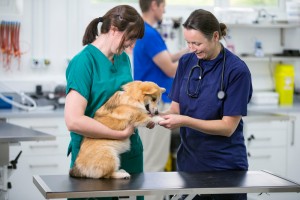Veterinary Medicine Faces Post-Covid Challenges
By Amy Fernandez
 Predictions about our post-Covid recovery haven’t quite turned out as expected in any sector of life. Such a drastic disaster is bound to have a tremendous impact. And economic/demographic recovery forecasts have limited value in an unprecedented situation. For instance, the veterinary profession was among the few that were spared from the financial crunch of pandemic restrictions. Designated as an essential service, which they are, veterinarians didn’t suffer the economic hardship of, say, the restaurant industry–which may never fully recover. Additionally, Americans acquired millions of new pets in response to the Covid lockdowns which created a brand-new customer base for veterinary services.
Predictions about our post-Covid recovery haven’t quite turned out as expected in any sector of life. Such a drastic disaster is bound to have a tremendous impact. And economic/demographic recovery forecasts have limited value in an unprecedented situation. For instance, the veterinary profession was among the few that were spared from the financial crunch of pandemic restrictions. Designated as an essential service, which they are, veterinarians didn’t suffer the economic hardship of, say, the restaurant industry–which may never fully recover. Additionally, Americans acquired millions of new pets in response to the Covid lockdowns which created a brand-new customer base for veterinary services.
Broadly considered, this particular professional sector should be among the few that are currently enjoying a healthy rebound. On paper, it is. So why does it take so long to get an appointment these days? That complaint is coming from owners all over the country.
As noted, the Covid recovery has featured more than a few unanticipated surprises. And despite its exemption from the lockdown restrictions, Covid has still managed to throw a wrench into this particular recovery.
It’s big talk among vets for a couple reasons. The first is the challenge of recruiting a viable workforce. Despite the steady popularity of this profession, it has become almost impossible to hire enough vets or the essential tech staff required to maintain any successful practice.
Partly, this problem is a reflection of one of those unexpected Covid ramifications. After months of lockdowns, restrictions and hanging around the house, a lot of people realized that they hate going to work. Here in New York, midtown office space is running 55-70 percent vacancy rates and these stats are not unique to our city. Remote work proved to be an effective and efficient alternative in many businesses, and they’ve adjusted to this new reality. Flextime is fine for some jobs that primarily involve dealing with screens and phones. But that modality is a lot harder to implement in professions that require hands-on, in-person interaction. Good luck getting your car fixed online.
But it appears that flextime and/or me-time is here to stay. The 2022 AVMA conference in Philadelphia addressed this new reality with a presentation on “Creative Scheduling”, offering tips on recruiting and keeping new employees. The premise of that talk was the fact that these staffing issues actually existed before Covid. The pandemic simply amplified them. This has translated into longer waits for appointments, and bigger challenges finding vets that accept new clients. Needless to say, dogs tend to schedule their health care problems on their own time. Mine have an uncanny knack for arranging heart-stopping emergencies during long holiday weekends. Sometimes, you need a vet right now.
Even though autonomy has always been a major incentive to pursue any professional career, veterinary medicine is known to be high pressure and demanding. No one makes this career choice thinking it’s going to be five o’clock in Margaritaville. But certain aspects of it have definitely intensified since the advent of corporate culture and shareholder profits, but that’s another story.
Burnout has become a major topic within this job market. Defined by the WHO as feelings of exhaustion, cynicism or negativity pertaining to work combined with a sense of reduced professional efficacy–we’re all familiar with it–but it’s a relatively new concern in veterinary medicine. The interesting takeaway from the speaker, Dr. Tannetje Crocker, was her realization that working in a private practice offers much more control over decision-making, performance expectations and scheduling options.
However, it’s not only vets voicing dissatisfaction. Another recent AVMA editorial noted the difficulty in recruiting and retaining both office staff and vet techs–which are equally critical to quality care. And much of that is attributable to the alarming increase in incivility in the wake of Covid. This unfortunate social trend has become most notable in the airline industry. But in any business setting, customers behaving badly, or worse yet, threatening and occasionally assaulting employees, were an extremely rare occurrence. Now, nasty and sometimes violent interactions between staff and customers seem to be pervasive. Couple that with the fact that people tend to get especially touchy about their pets and the end result is plummeting morale and high job turnover.
It’s hard to say how or when any of this will have a positive resolution. But one thing’s for sure. There’s no excuse for disrespectful behavior.
Short URL: https://caninechronicle.com/?p=278513
Comments are closed












